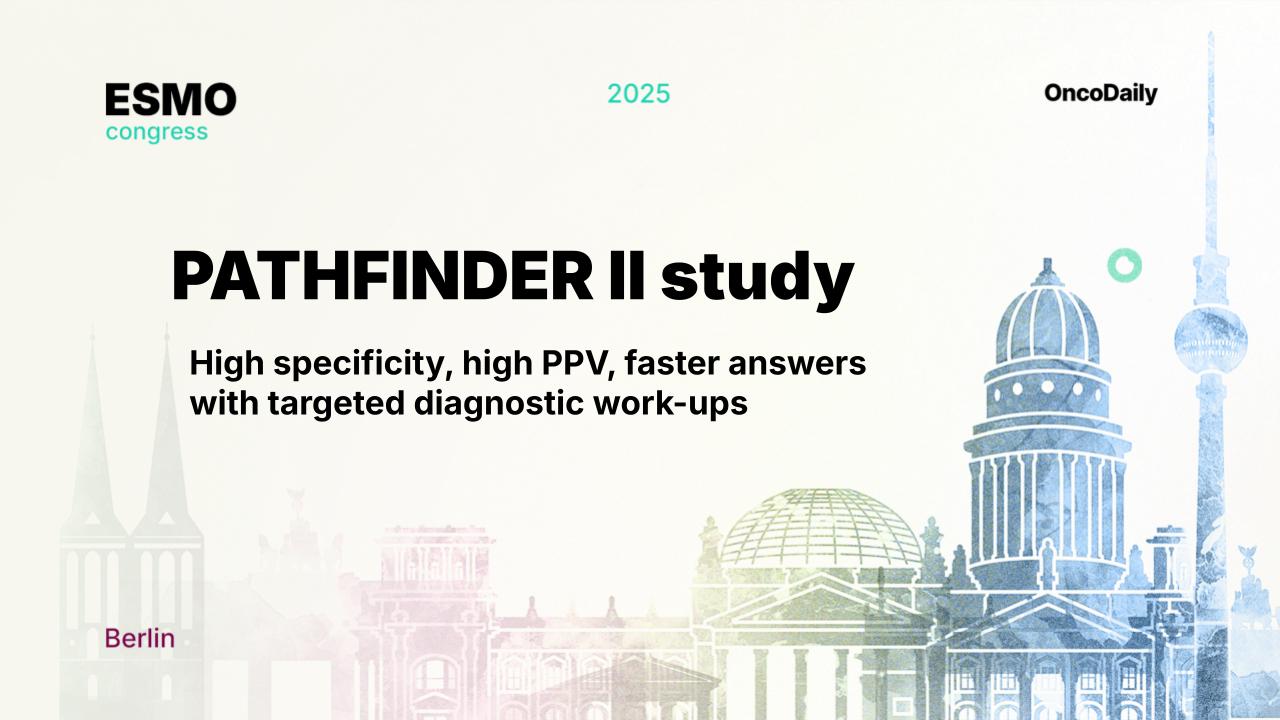At ESMO 2025, Nima Nabavizadeh presented PATHFINDER II study during Proffered Paper Session 1 on Basic science & Translational research, outlining the study’s design, safety profile, and performance of the Galleri® multi-cancer early detection test in an asymptomatic, intended-use population.
Background
The Galleri® multi-cancer early detection (MCED) test analyzes cell-free DNA to identify a cancer signal and predict the cancer signal origin (CSO), helping clinicians focus diagnostic work-ups. PATHFINDER 2 (PF2; NCT05155605) was designed to evaluate the test’s safety and performance in a large, diverse, intended-use population.
Methods
PF2 is a prospective, multicenter, interventional study enrolling adults ≥50 years with no clinical suspicion of cancer and no cancer diagnosis or treatment in the prior 3 years. Participants with a cancer-signal detected result proceeded to diagnostic evaluation guided by the test’s predicted CSO(s). This prespecified initial analysis includes participants with 12-month follow-up as of December 31, 2024; a 3-year follow-up is ongoing.
Results
- Cohort & test positives: 35,878 enrolled; 23,161 included in the 12-month performance set. Positivity rate 0.93% (216/23,161).
- Performance metrics: Specificity 99.6% (95% CI 99.5–99.7); PPV 61.6% (54.9–67.8); first-CSO accuracy 91.7% (85.8–95.3).
- Sensitivity (episode level): 73.7% (65.6–80.4) for a prespecified group of 12 cancers causing ~⅔ of U.S. cancer deaths; 40.4% (35.3–45.8) across all cancers.
- Cancers found & by whom: 329 total cancers during follow-up; 200 screen-detected → 133 by MCED (114 new primaries; 19 recurrent), 20 by USPSTF A/B screening, 47 by USPSTF C screening. MCED detection rate 0.57% (133/23,161).
- Cancer types & stage: 75.2% of MCED-detected cancers lacked common screening options. Of 114 MCED-detected new primaries, 53.5% stage I–II and 69.3% stage I–III.
- Time to answer: Median time to diagnostic resolution 46 days (IQR 42–59).
- Safety & work-ups: Among 25,114 safety-analyzable participants, 0.6% (n=159) underwent a protocol-directed invasive procedure; invasive procedures were ~2× more frequent in those ultimately diagnosed with cancer versus those not diagnosed after a positive test.
Conclusions
Layered onto guideline screening, MCED testing substantially increased the number of screen-detected cancers—nearly seven-fold over USPSTF A/B screening alone (and ~three-fold over A/B/C). Most MCED-detected new primaries were early-stage and in cancers without established screening. With very high specificity, PPV >60%, accurate CSO prediction, and a low rate of invasive evaluations, these initial PF2 findings support the population-scale use of MCED testing as a complement to current screening programs.
You can read the full abstract here.


